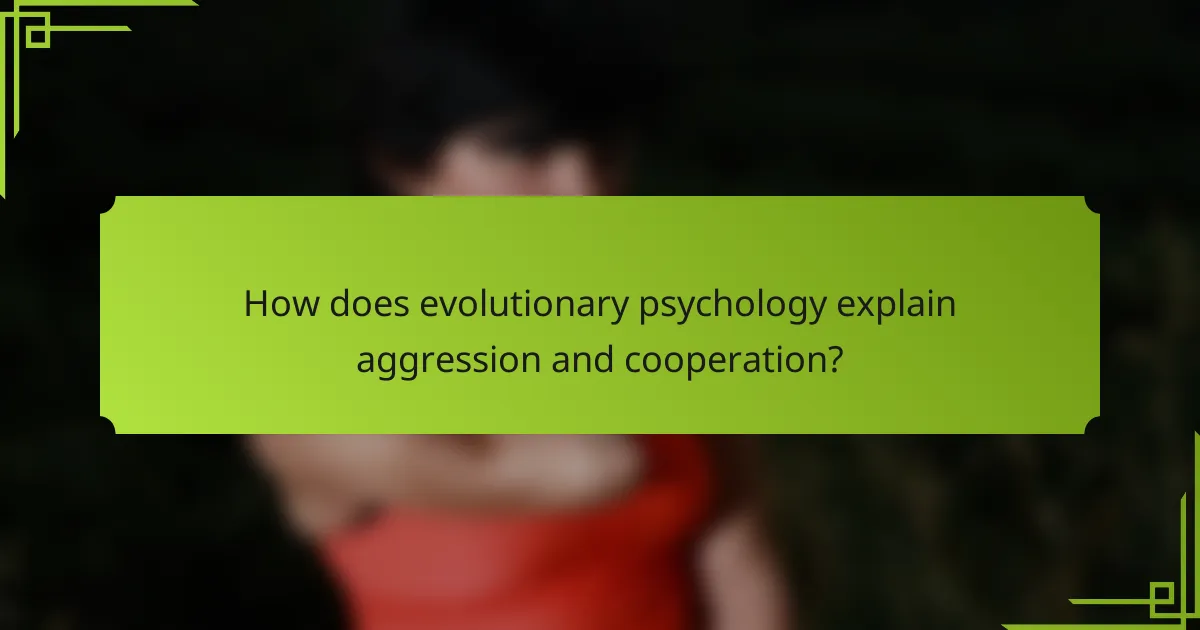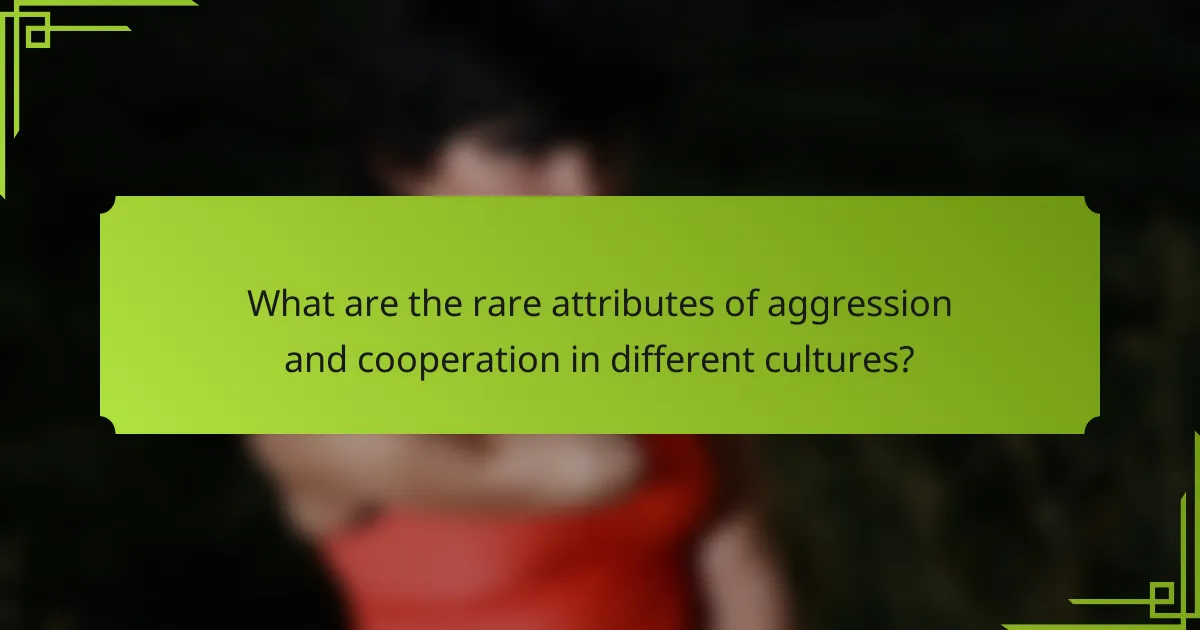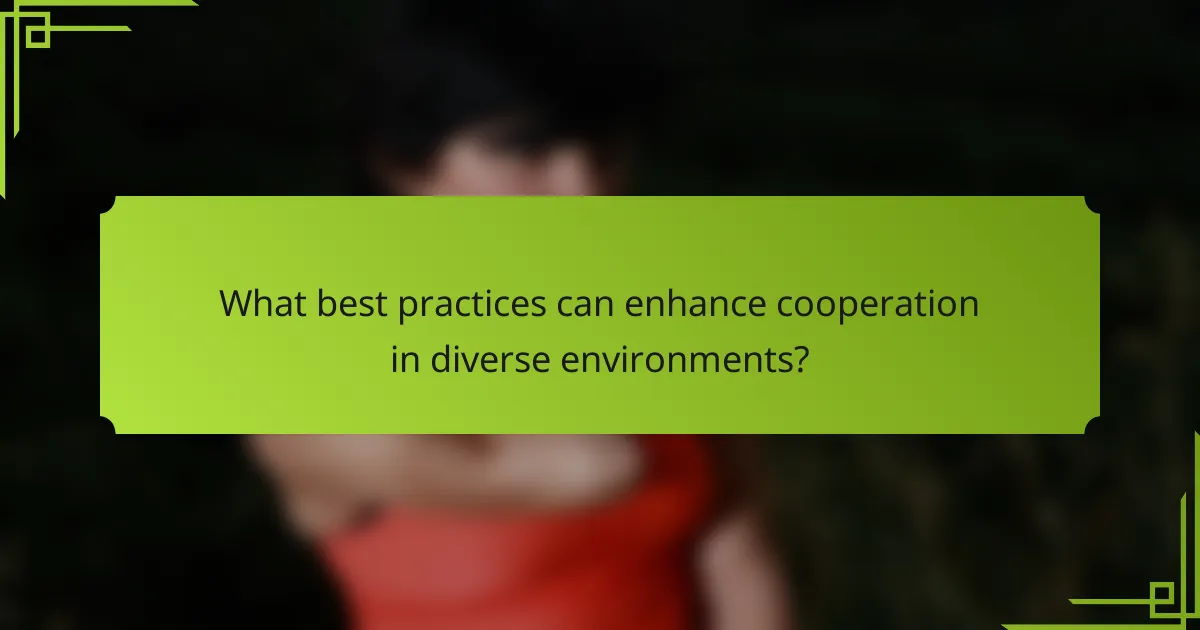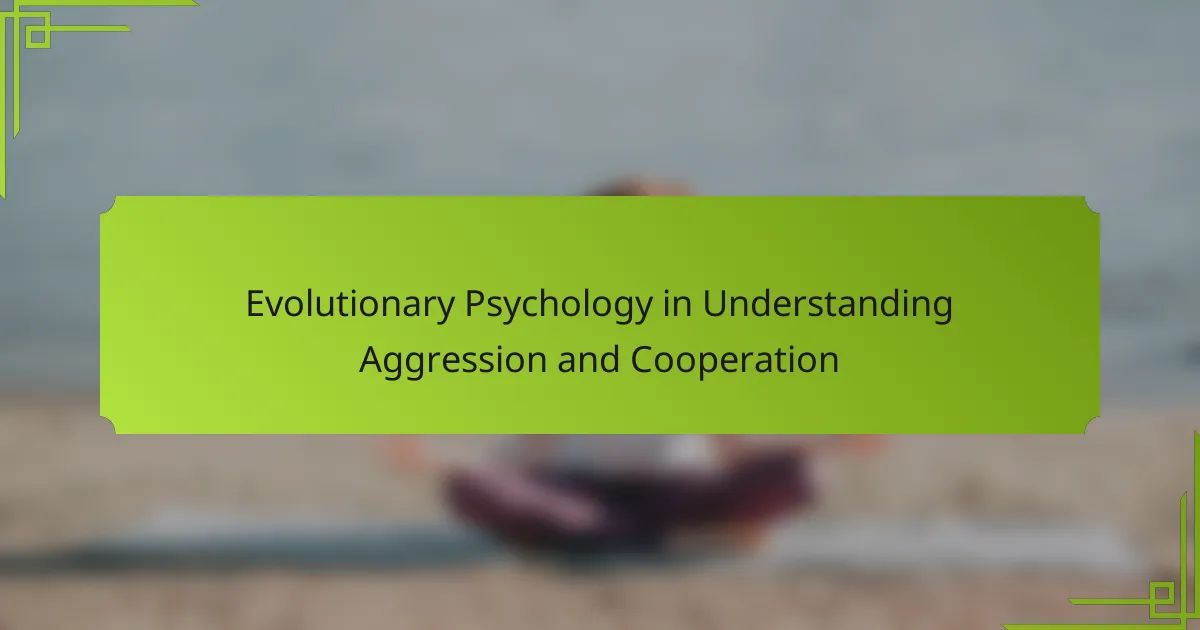Understanding the dynamics of aggression and cooperation can enhance interpersonal relationships and social structures. Evolutionary psychology reveals how these behaviors are shaped by natural selection. Key angles include the adaptive nature of aggression, cultural influences on these behaviors, and strategies for fostering cooperation. Insights into these aspects can improve group dynamics and promote social cohesion.

How does evolutionary psychology explain aggression and cooperation?
Evolutionary psychology explains aggression and cooperation as adaptive behaviors shaped by natural selection. Aggression can enhance survival by securing resources, while cooperation fosters social bonds and group success. These behaviors are rooted in evolutionary advantages that promote reproductive success. For instance, cooperative individuals may receive help in times of need, increasing their chances of survival. Unique attributes include variations in aggression levels based on environmental factors, while rare attributes may involve altruistic behaviors that benefit unrelated individuals. Understanding these dynamics provides insight into human interactions and societal structures.
What are the universal principles of aggression in evolutionary psychology?
Aggression in evolutionary psychology is driven by universal principles such as survival, reproductive success, and resource competition. These principles explain how aggressive behaviors can enhance fitness by securing mates and territory. For instance, males often exhibit aggression to establish dominance and attract females, while females may use indirect aggression to protect offspring. Understanding these principles helps clarify the adaptive functions of aggression in social contexts.
How do evolutionary theories define aggression?
Evolutionary theories define aggression as a behavior that enhances survival and reproductive success. These theories suggest aggression can be adaptive, facilitating resource acquisition and mating opportunities. For instance, male aggression often relates to competition for mates, while female aggression may focus on protecting offspring. Understanding these dynamics reveals how aggression is shaped by evolutionary pressures, emphasizing its role in human behavior.
What role does natural selection play in aggressive behavior?
Natural selection influences aggressive behavior by favoring traits that enhance survival and reproductive success. Aggression can serve as a strategy for securing resources, mates, and territory. For example, in competitive environments, individuals exhibiting aggression may deter rivals, thus increasing their chances of passing on genes. This evolutionary perspective highlights the adaptive functions of aggression, revealing its role in social hierarchies and conflict resolution. Understanding these dynamics provides insight into both aggression and cooperation in human behavior.
What are the unique factors influencing cooperation among humans?
Cooperation among humans is influenced by unique factors such as social norms, empathy, and reciprocity. Social norms establish expectations for behavior, guiding individuals toward cooperative actions. Empathy enables people to understand others’ feelings, fostering connections that encourage collaboration. Reciprocity creates a cycle of mutual benefit, increasing the likelihood of cooperative behavior over time. These factors interact to shape human relationships and social structures, ultimately enhancing group cohesion and survival.
How do kin selection and reciprocal altruism foster cooperation?
Kin selection and reciprocal altruism promote cooperation by enhancing survival and reproductive success among related individuals. Kin selection favors altruistic behavior towards relatives, increasing the likelihood of shared genetic traits. Reciprocal altruism encourages cooperation among non-relatives through mutual benefit, fostering social bonds. These mechanisms create an environment where cooperation becomes advantageous, reinforcing group dynamics and evolutionary success.
What psychological mechanisms underlie cooperative behavior?
Cooperative behavior is driven by psychological mechanisms such as empathy, social norms, and reciprocal altruism. These mechanisms promote collaboration and trust among individuals. Empathy allows individuals to understand and share feelings, fostering connections that encourage cooperation. Social norms create expectations for cooperative behavior, reinforcing group cohesion. Reciprocal altruism suggests that individuals cooperate with the expectation of mutual benefit, enhancing survival and reproductive success.

What are the rare attributes of aggression and cooperation in different cultures?
Aggression and cooperation exhibit rare attributes influenced by cultural contexts. In some cultures, aggression may be linked to honour, prompting individuals to defend their reputation. Conversely, cooperation in collectivist societies often emphasizes community well-being over individual gain. Unique practices, such as conflict resolution rituals, can also emerge, showcasing how cultures navigate aggression. Furthermore, rare instances of cooperative behavior can be seen in cultures that prioritize environmental stewardship, fostering group cohesion through shared ecological goals.
How do cultural contexts shape aggressive behaviors?
Cultural contexts significantly influence aggressive behaviors by shaping social norms and expectations. For instance, collectivist cultures may discourage open aggression to maintain group harmony, while individualistic cultures might tolerate or even encourage assertive behaviors. Research indicates that aggression can be perceived differently across cultures, affecting both expression and acceptance. Unique attributes such as cultural rituals or historical conflicts can further differentiate aggressive responses, revealing the complex interplay between environment and behavior. Understanding these dynamics is essential for addressing aggression in diverse settings.
What are notable examples of aggression in specific societies?
Notable examples of aggression in specific societies illustrate how cultural contexts shape behaviors. In ancient Rome, gladiatorial games showcased institutionalised violence for entertainment. The Maasai of East Africa engage in warrior traditions, emphasizing bravery and aggression in defence of their communities. In modern contexts, street gangs in urban areas often exhibit aggression as a means of asserting territory and identity. These examples reveal the interplay between societal norms and expressions of aggression.
What are the implications of evolutionary psychology for modern social conflicts?
Evolutionary psychology offers insights into modern social conflicts by highlighting innate behaviors shaped by survival and reproduction. Understanding aggression and cooperation through this lens reveals patterns that influence group dynamics and interpersonal relationships.
For example, evolutionary predispositions can explain why individuals may resort to aggression in competitive environments, as it historically ensured resource acquisition. Conversely, cooperation fosters group cohesion, enhancing survival chances.
These behaviors manifest in contemporary issues like political polarization and social unrest, where ingrained instincts clash with modern societal values. Recognising these evolutionary roots can guide conflict resolution strategies, promoting empathy and collaboration.
Ultimately, evolutionary psychology underscores the complexity of human behavior, suggesting that addressing social conflicts requires acknowledging both our primal instincts and the need for cooperative solutions.

What best practices can enhance cooperation in diverse environments?
Fostering cooperation in diverse environments requires embracing inclusivity and understanding. Establishing clear communication channels enhances trust and collaboration. Encouraging empathy through shared experiences can reduce aggression and promote understanding among individuals. Implementing team-building activities that celebrate diversity can strengthen bonds and improve group dynamics.
How can understanding evolutionary psychology improve teamwork?
Understanding evolutionary psychology can significantly enhance teamwork by fostering cooperation and reducing aggression. It reveals innate behaviors that influence interpersonal dynamics. Recognising these patterns helps teams navigate conflicts and build trust.
Evolutionary psychology emphasizes that cooperation has survival benefits, promoting group cohesion. Teams that understand these principles can leverage shared goals, leading to improved collaboration. As a result, members become more aligned and motivated to achieve collective success.
By applying insights from evolutionary psychology, teams can establish clearer communication and empathy, essential for effective collaboration. This understanding allows team members to appreciate diverse perspectives, enhancing problem-solving capabilities.
Finally, fostering a culture that embraces these psychological insights can lead to long-term improvements in team performance and satisfaction. Teams that effectively utilise evolutionary psychology principles are likely to experience increased resilience and adaptability in facing challenges.
What common mistakes should be avoided in fostering cooperation?
To foster cooperation effectively, avoid common mistakes such as lack of clear communication, ignoring individual motivations, fostering competition instead of collaboration, and failing to establish trust. Clear communication ensures everyone understands goals and expectations. Recognising individual motivations enhances engagement. Promoting collaboration over competition builds a supportive environment. Establishing trust is essential for open dialogue and mutual respect.
What expert insights can guide effective conflict resolution?
Effective conflict resolution can be guided by insights from evolutionary psychology, emphasizing cooperation over aggression. Understanding the evolutionary roots of human behavior reveals that collaboration enhances survival. Research indicates that cooperative strategies lead to better outcomes in conflict situations. For instance, individuals who prioritize mutual benefit often achieve more sustainable resolutions. This approach fosters trust and reduces hostility, ultimately promoting long-term relationships. Adopting a mindset focused on shared goals can transform conflicts into opportunities for growth and understanding.
